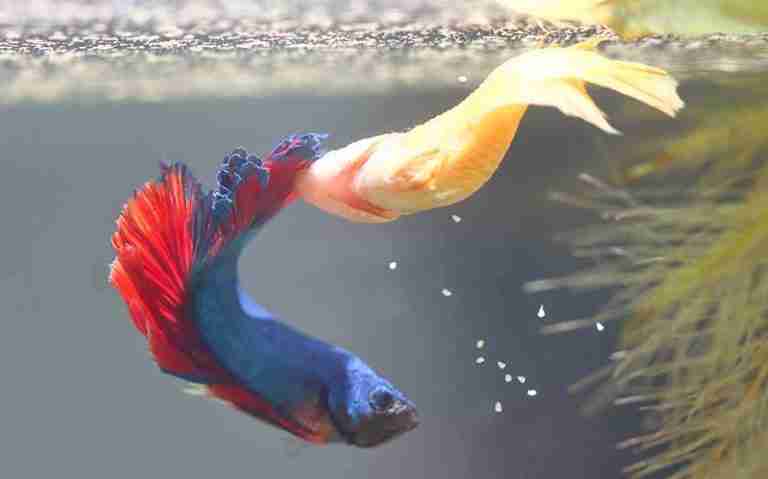How To Euthanize A Betta Fish (Humanely & Painlessly)
As a betta owner, you understand the pleasure this beautiful and intelligent fish can bring, which makes it difficult to accept when they become sick beyond treatment. Should you sit and watch your pet suffer as it slowly dies, or do you make the difficult decision to kill it quickly and as painlessly as possible?
There are several ways to euthanize a betta fish. Clove oil is the most popular and humane method to use at home. Some methods are considered cruel such as freezing or adding alcohol to the fish tank. I always advise consulting an aquatic specialist or veterinarian before proceeding.
In their natural habitat, sick betta fish die a natural death without intervention from humans. Death is a natural part of life and is experienced by all living things. If you have the choice to euthanize your betta fish, it may be kinder than keeping your fish alive.

There is no shame in trying to stop your betta fish from suffering for days or even weeks on end, but you need to know that it really is their time to go and that all treatment options have been exhausted.
This article will not only explain how to euthanize a betta fish, but it also discusses the most humane methods and the reasons why euthanizing fish may be the best option.
How To Humanely Euthanize A Betta Fish
In this section, I explain how to euthanize a betta fish as quickly and humanely as possible. I concentrate on my preferred method of clove oil because it is readily available and commonly used.
The clove oil method is perfect for euthanizing fish. Clove oil is a natural anesthetic that, when mixed into a small amount of water with your betta fish, causes drowsiness and numbs any pain, which makes it much more humane.
As well as clove oil, the following sections discuss some of the other methods of euthanizing betta fish at home, although some are considered quite inhumane.
How To Humanely Euthanize A Fish With Clove Oil
Once you have decided that your fish is suffering needlessly and there is nothing else that can be done to save them, it is time to euthanize them.
Feel free to seek professional advice on how to euthanize your fish correctly, or you can follow the steps below, which I have used myself after my own careful research.
What You Need
You will need the following items before euthanizing your betta fish.
- Essential clove oil or pure clove oil is most commonly found in most supermarkets, pharmacies, and health food stores.
- A container or small bucket for your betta fish.
- A cup or small container for making your clove oil mixture.
- A net to transfer your betta fish.

How To Euthanize A Betta Fish With Clove Oil
- First, add some tank water to the bucket or container you will use for your betta fish. Don’t add too much water; you’ll be adding the clove oil mixture, but ensure that your betta is comfortable.
- Half-fill the other container or cup with tank water and add 3-4 drops of clove oil.
- Mix the clove oil thoroughly.
- Gently transfer your betta fish to the larger container using the net.
- Add half of the clove oil mixture to your betta’s container giving it a moment to disperse, then add the rest.
- As the clove oil takes effect, your betta fish should become sluggish and sleepy, eventually sinking to the bottom. If this doesn’t happen, keep adding 1-2 more drops and waiting until your betta looks to be sleeping.
- Continue adding 1 more drop of clove oil every few minutes until your betta shows no signs of life. Check your fish’s gills for movement. When no gill movement has been seen for approximately 5 minutes, you can be sure your betta died peacefully in its sleep.
- You can now dispose of your dead fish in an appropriate manner.
Due to the anesthetic effect of clove oil, your fish won’t suffer. Breathing becomes shallow, putting your fish into a euphoric state caused by the lack of oxygen. It is not easy to euthanize a sick fish, especially your own pet, but clove oil is a very humane way to do it.
I found the helpful video above on Youtube demonstrating how to use clove oil to euthanize a betta fish. It also talks about other methods mentioned later in this post.
How To Euthanize A Fish Without Clove Oil
There are several methods that people use to euthanize fish that don’t involve using an anesthetic such as clove oil. I don’t use or recommend any of these methods myself, especially when clove oil is so easy to find.
How To Euthanize A Fish With Baking Soda
Adding baking soda to water quickly reduces the oxygen content, suffocating your fish until it loses consciousness and eventually dies.
You need to remove your fish to a smaller container and add a teaspoon of baking soda to the water. It usually takes 15-20 minutes until your fish becomes unresponsive. Once your fish has shown no signs of movement for 5 minutes (including gill movement), you can assume the fish has died.
I don’t like recommending baking soda as it takes quite a while for your fish to die, so they most likely experience some level of distress.
Baking soda isn’t well suited to euthanizing betta fish because they can breathe oxygen from the air through a labyrinth organ. As soon as oxygen levels drop within the water, your betta fish will move to the surface to fight for air, causing it to suffer for longer.
How To Euthanize A Fish By Freezing
I have read that freezing is a commonly used method of euthanasia among fish keepers, but whether it is humane or not is open to debate.
The theory is that you put your fish in an ice water bath until it becomes lethargic, suffering a form of hypothermia. Once your fish becomes extremely sluggish and confused, it should be placed in a freezer until it dies.
I would assume that putting a fish in ice water would cause some level of discomfort and possibly some pain, at least until it loses consciousness.
Freezing a betta fish will certainly kill it as they are tropical fish that need warm water to survive. However, certain fish, such as some goldfish species can adapt to cold temperatures, often going into hibernation. Using an ice bath would probably take too long to work on cold water fish.
How Not To Euthanize A Fish
I have described a few methods of euthanizing fish that I don’t feel are the most humane, but there are definitely some methods that can be considered very cruel.
The below methods are legitimate ways to euthanize fish, although I wouldn’t recommend any of them myself.
The Stun And Stab Method
The stun and stab method is generally used by fishermen to kill their catch. The method involves hitting your fish around the head to stun it and then severing the spine with a sharp knife.
This is a method that may be acceptable to fishermen, but doing it to your pet betta fish may give you or your children some sleepless nights.
Using Boiling Water
That’s right, some people actually consider putting their betta fish into boiling water. Not only will this method cause your betta fish a very painful death, but if your betta survives, it will have suffered severe injuries that will inevitably kill it.
Let’s leave the boiling water method alone or use it to cook a dead fish instead.
Using Alcohol
Euthanizing a betta fish with alcohol can be considered inhumane. Alcohol is very toxic to a fish, causing pain and suffering before death occurs. Many people talk about using vodka to put down their fish or even mixing vodka with clove oil, but clove oil works well by itself.
Suffocation
The most obvious way to euthanize a fish is through suffocation. Remove a fish from the water so it cannot breathe, and it will eventually die. This is true for most fish, but death can take too long, causing suffering as your pet fish gasps for air.
Suffocation won’t work on betta fish as they can breathe air from outside of their tank. A betta fish that’s out of the water for a long time slowly drys out and dies from dehydration, not suffocation.
When To Euthanize A Betta Fish
Knowing when to euthanize a betta fish is vital. You need to understand why your betta fish is sick and try all available treatments before making the decision to put your betta down.
The most common reasons to euthanize a betta fish are:
- Your betta fish is terminally ill and is suffering.
- Your betta fish has a condition that gives a poor quality of life, and it is slowly deteriorating.
- Your betta fish is not eating due to an untreatable illness or a condition that is preventing your betta from eating, causing it to waste away slowly.
- Your betta fish has been injured and is in pain.
If you are unable to decide if your betta fits into the categories above, it’s best to seek advice from an aquatic specialist or a qualified veterinarian who will help diagnose and provide some potential treatment options.
Certain conditions, such as tumors, can cause severe distress to an otherwise healthy fish. It can be difficult to watch your fish suffer for several years from such conditions.

If your betta fish has received treatment that has failed, or there are no treatments available, you need to decide how much impact the condition or illness is having on your betta’s quality of life. You should also take into account how much your betta fish is suffering.
Also, read my article: How To Tell If Your Betta Fish Is Dying Of Old Age.
Conditions That Can Reduce Your Betta’s Quality Of Life
Certain illnesses or conditions can affect your betta’s ability to eat or navigate safely around the tank without causing injury.
Swim bladder disease
Swim bladder disease in betta fish is quite common and is often a symptom of an underlying disease or condition. The swim bladder is an inflatable organ that controls buoyancy. The function of the swim bladder can be impaired when obstructed from inflating by a tumor, bloating, or swelling.
Some fish can have a genetic defect that impairs swim bladder functionality. Genetic defects are usually present from birth, and fish adapt to cope, often living long and healthy lives. However, some defects can get worse with age. Find out more about the betta’s lifespan here: How Long Do Betta Fish Live?
If your betta is suffering from swim bladder disease, it’s probably floating around the tank swimming on its side or swimming upside down, which makes it very difficult for your betta to eat, severely impacting its quality of life.
A swim bladder disorder can often be treated when caused by constipation or inflammation. If a swim bladder disorder is caused by a cancerous tumor or other untreatable condition, it may soon be time to euthanize your betta.
Cancer In Betta Fish
Cancers are not only found in people; they are also found in animals, with no treatments available. Diagnosing cancer in fish is also very difficult as it often presents as a general and sudden decline in health, or a visible tumor may be present.
If your betta fish has cancer, it will probably become very sick and be in a great deal of pain and discomfort. Your betta’s appetite will fade as it gradually wastes away. This is a perfect example of when to euthanize your betta fish to spare it from a lot of suffering.
Because cancers in fish are so hard to diagnose, you may overlook a much more treatable condition, and this is why I always advise that you seek advice when trying to diagnose any illness in your betta fish.
Dropsy In Betta Fish
Dropsy is another condition found in betta fish that is caused by an underlying condition. Dropsy is an accumulation of fluid under the skin that causes significant bloating or swelling, eventually causing a betta’s scales to stand out (often referred to as pineconing).
Dropsy in betta fish is often caused by bacterial infections that impact the functioning of the kidneys and gills, or your betta may have another condition that also impairs normal kidney function.
Although dropsy can be treated, especially in the early stages, kidney failure is commonly a sign of more serious conditions or general old age. Dropsy that has not responded to treatment, or where the underlying cause cannot be treated, will eventually lead to death.
Euthanasia is often the kindest option when your betta fish has dropsy, as the condition can be very painful and uncomfortable. It can also take a long time for your betta to die from dropsy, so euthanasia may spare your betta from a lot of unnecessary suffering.
There are too many conditions and illnesses to list which can cause an irreversible decline in your betta’s health. The above examples should help you to understand when and why euthanasia may be the best option for your betta fish.
How Do I Know If My Betta Fish Is Suffering?
If you have had your betta fish for a while, you probably know how it generally behaves and will notice subtle changes in its behavior.
You can tell that a betta fish is suffering by watching how they behave. Your betta may stop eating completely and begin losing weight. Your betta may become more aggressive or withdrawn when it is in pain. Your betta may lose the ability to swim, causing injuries to occur.
The most common signs of a betta fish suffering and in pain are:
- Loss of appetite – Your betta may stop eating or only eat very small amounts, which is a sure sign of illness or suffering and eventually leads to weight loss and slow death.
- Rapid weight loss – If your betta is losing weight but seems to be eating normally, it is often a sign of severe illness. Weight loss can cause weakness and other health issues, eventually leading to death.
- Shallow and labored breathing – Shallow breathing is often a sign that your betta is close to death. They may swim on the spot away from the current or curl up somewhere quiet in the tank.
- Clamped fins – When a betta fish has clamped fins, it’s usually suffering and in pain or is very stressed. You can recognize clamped fins by the way they are pulled tightly together compared to their usual free-flowing nature.
- Hiding away – If your betta fish is hiding more than usual, it is either sleeping more or hiding from the threat of other fish. Whichever reason your betta is hiding, it is likely caused by illness.
- Refusing to interact – If your betta is usually quite social and suddenly refuses to interact with you, it is a sign that something is wrong. Betta fish usually enjoy being around people, so this sudden change in behavior is a red flag.
- Lethargy – A betta that is suffering becomes very tired and sluggish. They can have trouble swimming and may even float to the surface or sink to the bottom of their tank.
- Spasms or twitching – Painful conditions can cause your betta fish to have spasms or twitch uncontrollably. This is often a sign of fish parasites, infection, trauma, or even tumors.
- Flashing or rubbing against rocks and other sharp objects – If your betta is flashing or rubbing against objects in their tank, it is a sign that they may be suffering pain. This behavior can cause open wounds, which can lead to infection.
- Difficulty swimming – If your betta is having difficulty swimming, it is likely due to an injury or illness. This can include something as simple as swim bladder disease, which makes it hard to control buoyancy, or a more serious condition like dropsy which causes fluid build-up in the abdomen, making it hard to swim.
The list above is only some of the potential signs that your betta fish may be suffering or in pain. You need to apply some common sense, as a single symptom from the list may not signal impending death or significant suffering and may instead signal the onset of a treatable illness.
If your betta fish is unwell and all treatment methods have failed, the list above can help you recognize how much pain they are in or how much they are suffering. Once you have an understanding of your betta’s level of suffering, you can decide whether to intervene, sparing them a slow and painful death.
How Should You Dispose Of A Euthanized Betta Fish?
Once you have successfully euthanized your betta fish, you need to dispose of the fish’s body. There are several options to consider, which depend on how you or your family feel about your dead betta fish.

Burial
If you have children, they may not cope well with losing a family pet, so why not make a big deal of it and have a burial in your garden? This is also a good way of teaching children about death, and they will still feel that your betta is close by.
If you are going to have a burial, put your betta fish into a sealed box and make sure to bury it deep enough so it won’t be discovered and dug up by small animals. Say a few meaningful words, and ask your children if they would also like to say something nice.
Once you have buried your betta fish, you can mark the grave with a small cross or similar. Write your betta’s name and a nice quote or meme which will make your children smile each time they read it.
Cremation Or Pet Cemetary
If you can afford to, and you want to make an extra special effort, there are many pet cemeteries and crematoriums where you can give your betta fish a proper send-off.
Purchasing a piece of land to have your betta buried is much less expensive than for a human due to the size of the plot required, and the same is true for a headstone. Alternatively, you can get your betta fish cremated and keep it at home with your family.
Having a proper send-off can help many people, young and old, to deal with death much better, which is why this can be a great option.
Throw It In The Trash
Many people deal with the death of a fish with a simple nod and a few kind thoughts. The need for a funeral or burial is over the top and unnecessary. People are often ok with flushing their dead fish down the toilet or throwing them in the trash.
I don’t recommend flushing your betta fish down the toilet, as they are designed to remove waste that breaks down more easily. Ideally, put your betta fish in a sealed bag and pop it in the bin.
Conclusion
Although it’s sad when your betta fish is suffering beyond any help, the decision to euthanize your betta is a kind one that speeds up its inevitable death, putting it out of its misery.
It is easy to sometimes assume that a fish is sick beyond treatment, so you should always seek advice on potential treatments before making the decision to end your betta’s life.
I have concentrated on my preferred method of using clove oil because I think it is quick, easy, and humane, but you can also ask a veterinarian to euthanize your fish using medications of their choice.
Other methods I have talked about in this post are not the kindest, in my opinion, and then there are some which are darn right cruel, but I hope that I have covered the subject completely enough to give you the confidence to make the right choice.








